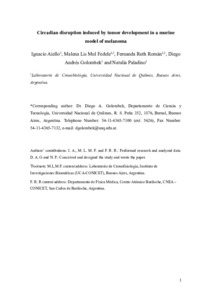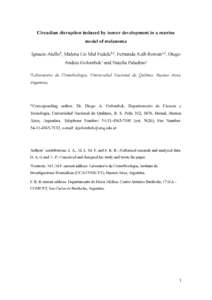Por favor, use este identificador para citar o enlazar este ítem:
https://repositorio.uca.edu.ar/handle/123456789/12808| Título: | Circadian disruption induced by tumor development in a murine model of melanoma | Autor: | Aiello, Ignacio Mul Fedele, Malena Lis Román, Fernanda Ruth Golombek, Diego A. Paladino, Natalia |
Palabras clave: | RITMO CIRCADIANO; TUMORES; CANCER; GLUCOCORTICOIDES | Fecha de publicación: | 2021 | Editorial: | Taylor & Francis | Cita: | Aiello, I., et al. Circadian disruption induced by tumor development in a murine model of melanoma [en línea]. Chronobiology International. 2021, Septiembre doi:10.1080/07420528.2021.1964519 Disponible en: https://repositorio.uca.edu.ar/handle/123456789/12808 | Resumen: | Abstract: The circadian system induces oscillations in most physiological variables, with periods close to 24 hours. Dysfunctions in clock-controlled body functions, such as sleep disorders, as well as deregulation of clock gene expression or glucocorticoid levels have been observed in cancer patients. Moreover, these disorders have been associated with a poor prognosis or worse response to treatment. This work explored the circadian rhythms at behavioral and molecular levels in a murine melanoma model induced by subcutaneous inoculation of B16 tumoral cells. We observed that the presence of the tumors induced a decrease in the sturdiness of the locomotor activity rhythms and in the amount of nighttime activity, together with a delay in the acrophase and in the activity onset. Moreover, these differences were more marked when the tumor size was larger than in the initial stages of the tumorigenesis protocol. In addition, serum glucocorticoids, which exhibit strong clock-controlled rhythms, lost their circadian patterns. Similarly, the rhythmic expression of the clock genes Bmal1 and Cry1 in the hypothalamic Suprachiasmatic Nuclei (SCN) were also disrupted in mice carrying tumors. Altogether, these results suggest that tumor-secreted molecules (i.e., tumor macroenvironment) could modulate the function of the central circadian pacemaker (SCN). This could account for the worsening of the peripheral biological rhythms such as locomotor activity or serum glucocorticoids. Since disruption of the circadian rhythms might accelerate tumorigenesis, monitoring circadian patterns in cancer patients could offer a new tool to get a better prognosis for this disease. | URI: | https://repositorio.uca.edu.ar/handle/123456789/12808 | ISSN: | 0742-0528 1525-6073 (online) |
Disciplina: | MEDICINA | DOI: | 10.1080/07420528.2021.1964519 | Derechos: | Acceso abierto. 12 meses de embargo | Fuente: | Chronobiology International. 2021, Septiembre |
| Aparece en las colecciones: | Artículos |
Ficheros en este ítem:
| Fichero | Descripción | Tamaño | Formato | |
|---|---|---|---|---|
| circadian-disruption-induced.pdf | 243,66 kB | Adobe PDF |  Visualizar/Abrir | |
| thumb.jpg | 173,47 kB | JPEG |  Visualizar/Abrir |
Visualizaciones de página(s)
56
comprobado en 27-abr-2024
Descarga(s)
144
comprobado en 27-abr-2024
Google ScholarTM
Ver en Google Scholar
Altmetric
Altmetric
Este ítem está sujeto a una Licencia Creative Commons

